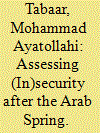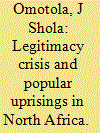|
|
|
Sort Order |
|
|
|
Items / Page
|
|
|
|
|
|
|
| Srl | Item |
| 1 |
ID:
117620


|
|
|
|
|
| Publication |
2012.
|
| Summary/Abstract |
Since late 2010, an unprecedented wave of protests demanding greater political freedoms, and in several countries even regime change, has swept across much of the Arab world. In Tunisia, Egypt, and Libya, long-standing autocrats have been toppled, and in other countries of the region seemingly well-established authoritarian regimes also appeared increasingly shaky in the face of growing opposition movements. The aim of this article is to examine the role of the armed forces in these popular uprisings. While military forces have been key actors in these Arab uprisings, they have responded quite differently across the region to prodemocracy movements, ranging from openness to protest movements, to internal fracturing, to firm support for the regime in power. This article argues that these differences can be explained with reference to different forms of civil-military relations and different characteristics of the military apparatus. It claims in particular that the degree of institutionalization of the armed forces and their relationship to society at large can account for the divergent responses to pro-reform movements.
|
|
|
|
|
|
|
|
|
|
|
|
|
|
|
|
| 2 |
ID:
126415


|
|
|
|
|
| Publication |
2013.
|
| Summary/Abstract |
In nearly three years, Egypt has transitioned from a large-scale uprising against one of the region's longest-standing rulers to an even more massive revolt that led to the military ousting the country's first democratically elected president, Mohamed Morsi. Between the two popular uprisings, new pacts and unlikely alliances emerged, deepened, and, in some cases, then disappeared. For its part, the army evolved from being an accomplice of the old regime, to then being an uneasy partner of the ascendant Muslim Brotherhood and, most recently, on to rebranding itself as an ally of non-Islamists and a protector of the popular will. Loosely aligned liberals, leftists, and nationalists, meanwhile, shifted from offering support for democratic elections to backing a "democratic" coup out of fear that the elected Islamists might monopolize and never relinquish power in a conservative new regime. That fear came in response to the Brotherhood's own shifting position, which moved from a commitment to "participation not domination" to a strategy of controlling the legislature and the presidency, although they were ultimately forced back into hiding before they could neutralize the judiciary and the army. And finally, the other Islamist movement, the ultraconservative Salafists, initially displayed no interest in the political process, but then mobilized and ultimately enjoyed striking success in the elections of 2011-12. Surprisingly, however, despite their presumed ideological proximity to the Brotherhood, many Salafists went on to back the military's removal of Morsi in July 2013, but then did not lend support to the interim government that was constructed in wake of Morsi's fall. In this multilayered, fast-paced political environment, mass protests, arrests, and violence have become routine.
|
|
|
|
|
|
|
|
|
|
|
|
|
|
|
|
| 3 |
ID:
115879


|
|
|
|
|
|
|
|